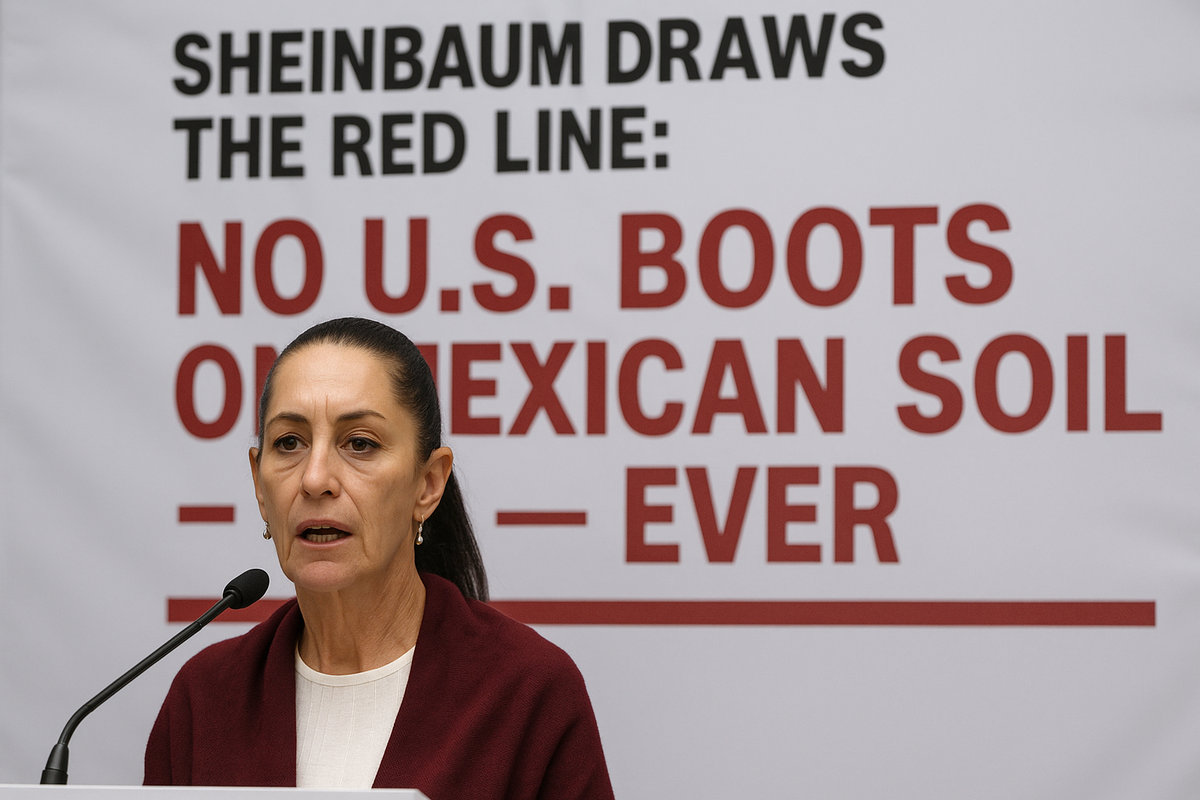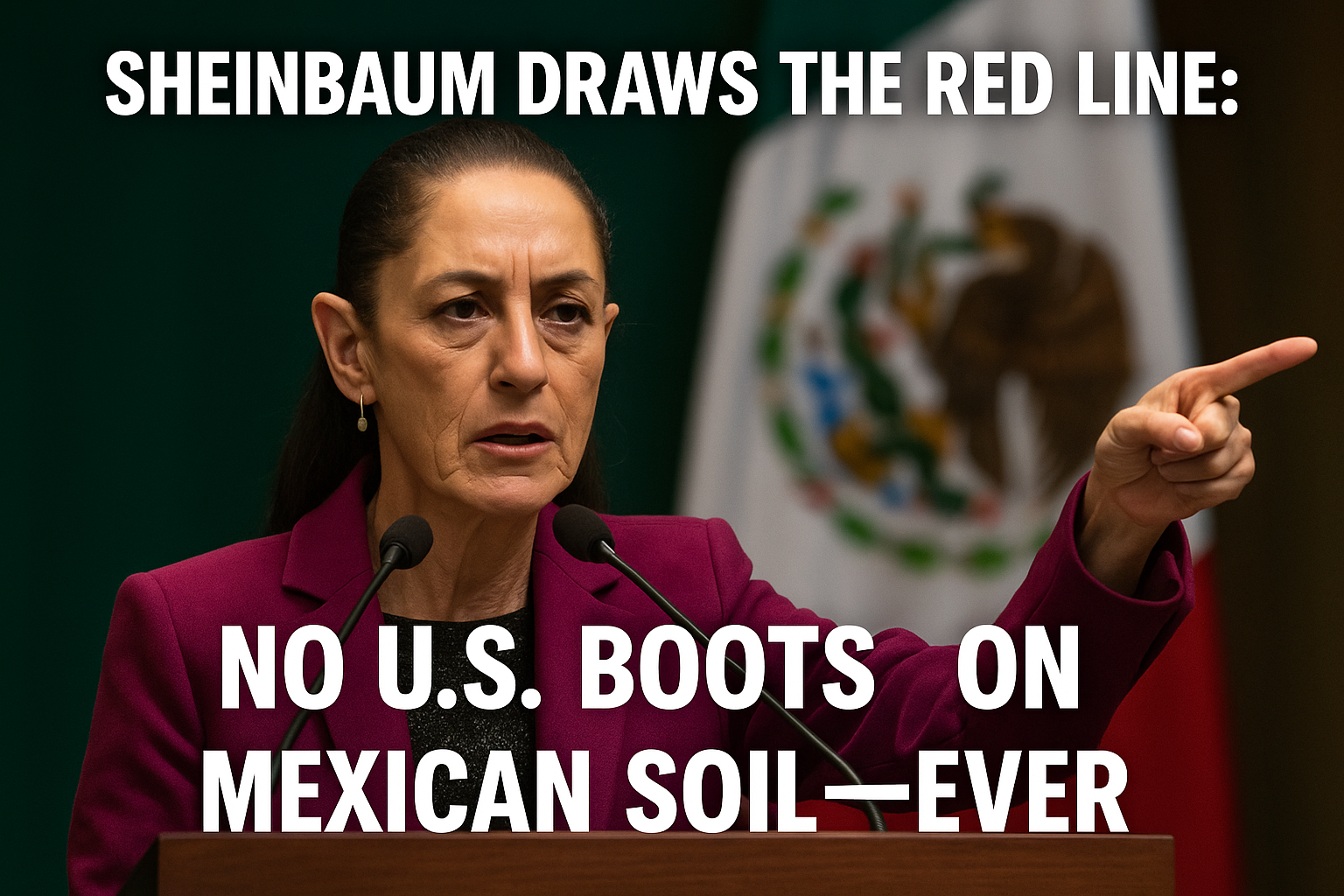Sheinbaum Draws the Red Line: No U.S. Boots on Mexican Soil—Ever

By Rafael Benavente
Introduction: A Stand for Sovereignty
In early August 2025, tensions escalated as reports surfaced that U.S. President Donald Trump had authorized military action against drug cartels—some of which operate in Mexico—by designating them as foreign terrorist organizations. In response, Mexican President Claudia Sheinbaum issued an emphatic declaration:
- "We will never put our sovereignty at risk. We will never put Mexico’s independence at risk. Mexico is a free, sovereign, independent country." Financial Timeschinadailyasia.com
Her assertive tone—rejecting any military incursion or implied loss of autonomy—has come to define her presidency’s approach to national security.
Backdrop: U.S. Policy Shift and Cartel Designations
In her first days back in office, President Trump classified several Mexican cartels as “foreign terrorist organizations,” allowing the U.S. to explore military and intelligence options beyond traditional law enforcement methods. These options reportedly include:
- Drone strikes
- Naval missile attacks
- Intelligence-driven strikes abroad
U.S. officials, including Secretary of State Marco Rubio, emphasized that such designations "allow us to now treat them as armed terrorist organizations"Financial TimesThe Washington Post.
Although Trump publicly offered military assistance to Mexico, Sheinbaum had firmly declined:
“The territory cannot be violated. Sovereignty cannot be sold. Sovereignty is cherished and defended.”
Thus, despite the escalated rhetoric from Washington, her administration has held the line on maintaining full control over domestic operations.
Sheinbaum’s Rejection: No Boots, No Drone Strikes—Only Cooperation
Across multiple press conferences and statements, President Sheinbaum has been clear:
- No physical U.S. military presence on Mexican soil
- Any drone surveillance over Mexico must be pre-approved by Mexican authorities
Mexico News Dailychinadailyasia.comFinancial TimesThe Guardian
She made clear that collaboration is acceptable—with full Mexican oversight. Anything else, she said, would erode sovereignty.
Mexico’s Foreign Ministry echoed her stance, reinforcing that the idea of straightforward military intervention was unacceptable. The GuardianReuters
Mexico’s Security Strategy: Collaboration, Not Subordination
President Sheinbaum’s broader security approach centers on sovereignty and strategic autonomy:
- Domestic reform and law enforcement strengthening
- Intelligence-driven strategies, minimal reliance on U.S. boots on the ground
Wikipedia+1
These efforts mark a break from past policy shifts and support a model of cooperation that respects Mexican leadership and vision.
Domestic and International Reactions
Domestic Reaction:
Sheinbaum’s uncompromising message has bolstered her approval, which remains above 70% as of August 2025. Many citizens see her stance as a patriotic assertion of Mexico’s independence.
International Reaction:
While U.S. policymakers argue that aggressive measures are necessary against the fentanyl crisis, lawmakers within the U.S.—such as Senator Tim Kaine—have raised concerns over legality and diplomacy, warning that unauthorized military action would undermine bilateral ties. The Washington Postnews.com.au
Security analysts also caution that targeted strikes or troop deployments, without Congress approval, could carry severe legal and diplomatic repercussions. news.com.auThe Washington Post
Historical Context: Sovereignty as Core to Mexico’s Identity
Mexico’s stance today draws from historical experiences:
- In the early 19th century, the country lost vast territories to the U.S.; that memory still resonates, making sovereignty a deeply emotional principle.
- During the Mérida Initiative under prior administrations, cooperation was strong—but always framed with clear limits on U.S. presence. Wikipedia
Sheinbaum’s current messaging builds on that legacy—asserting that collaboration can exist without yielding control.

Detailed Analysis: Why Sovereignty Matters
- Legal Foundation
Unilateral U.S. military actions—even under the guise of antiterrorism—could violate international law and treaties unless formally approved, potentially exposing U.S. personnel to legal risk. - Political Autonomy
Allowing foreign troops might set a dangerous precedent and could be used by critics to question the government’s autonomy. - National Unity
Her firm stance resonates with the public’s sentiment and strengthens national identity, yielding political capital. - Smart Diplomacy
Pursuing intelligence-sharing, law enforcement training, and bilateral coordination offers a sustainable path—responsive yet respectful.
Future Outlook: What Lies Ahead
Diplomacy & Strategy
Future coordination efforts will likely focus on intelligence and border control—not direct military action. Cross-border intelligence-sharing may increase, staying within Mexican oversight.
Political Landscape
Any shift—like approval of drone strikes without consent—could provoke backlash in Mexico and lead to questioning of the president’s authority.
Public Barometers
If violence or cartel influence resurges, pressure may rise. However, Sheinbaum’s political standing suggests she can navigate these challenges with resilience.
Conclusion: Sovereignty as the Backbone
Claudia Sheinbaum’s recent declarations chart a course rooted in national pride, legal integrity, and calculated cooperation:
- She rejects U.S. military presence—period.
- She welcomes partnership—but under Mexican leadership.
- She remains politically strong—and likely will continue balancing security and sovereignty.
In times of geopolitical shifts, her message remains clear: Mexico will not yield its independence. That principle defines this moment in history—and for her presidency.
By Rafael Benavente
other blogs,
rafael benavente - mexico aviation showdown
rafael benavente - Gringo go home!
